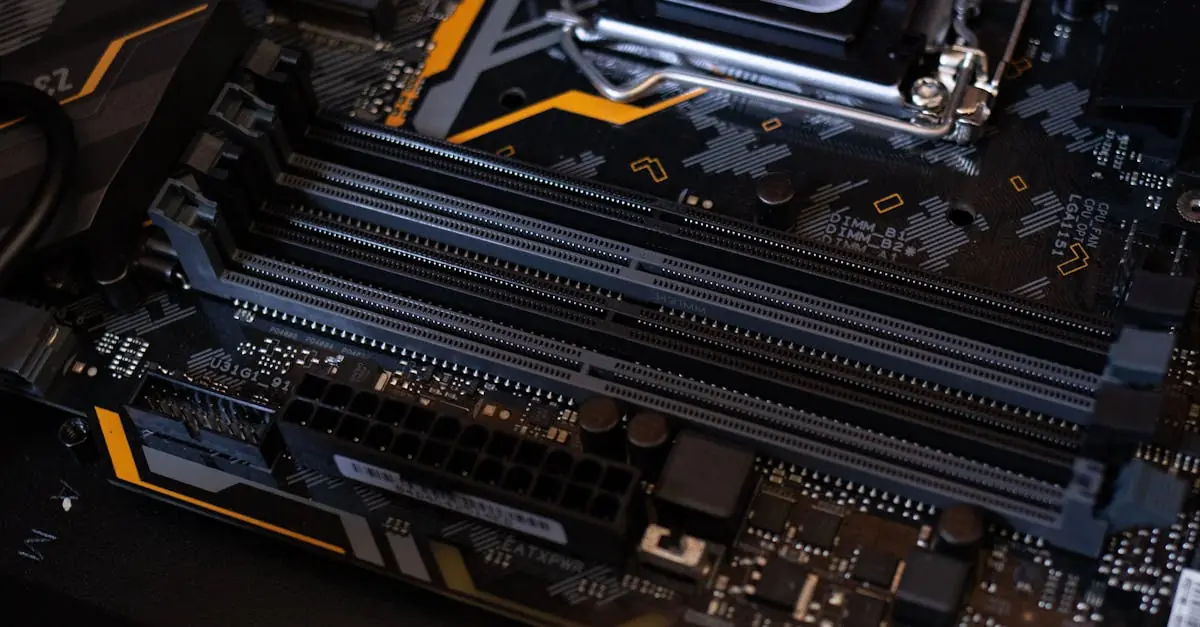Table of Contents
ToggleIn the fast-paced world of electric vehicles, the CCS connector stands out like a superhero in a sea of sidekicks. With its sleek design and impressive charging capabilities, it’s the go-to choice for EV enthusiasts looking to power up in a flash. Imagine pulling into a charging station and feeling like a pit stop pro—thanks to CCS, that dream can be a reality.
Overview of CCS Connector
CCS stands for Combined Charging System, which serves as an essential solution for electric vehicle (EV) charging. Its design incorporates both AC and DC charging standards, facilitating versatility for users. Many manufacturers and charging stations adopt CCS due to its compatibility with a wide range of EV models.
Charging speeds offered by CCS cater to various needs, with some systems providing up to 350 kW. These high speeds significantly reduce downtime, enabling drivers to recharge quickly during long journeys. Developers engineered CCS to ensure safer connections and more efficient energy transfer, enhancing user experience.
Standards defined by CCS promote global compatibility, making it a preferred choice in numerous countries. The integration of communication protocols within the connector ensures optimal performance across different charging networks. With ongoing advancements, the CCS connector continues to adapt to new technologies and market demands.
Moreover, a growing network of fast-charging stations supports CCS, fostering greater adoption of electric vehicles. Notable auto manufacturers endorse CCS as a primary charging method, reinforcing its status in the EV infrastructure. This widespread support signifies a shift toward a unified charging experience, simplifying access for EV users.
The popularity of CCS stems from its user-friendly features and efficiency. Though alternatives exist, CCS stands out for its combination of speed, safety, and compatibility. As electric vehicles evolve, CCS remains at the forefront of charging solutions, shaping the future of transportation.
Technical Specifications
The CCS connector exemplifies advanced engineering within electric vehicle charging technology. Its design incorporates both AC and DC pin configurations, supporting a wide range of charging needs.
Pin Configuration
Pin configuration defines the electrical specifications for charging. CCS connectors include two AC pins and two additional DC pins. These DC pins enable fast charging capabilities, allowing energy transfer rates up to 350 kW. The connector’s robust design ensures secure connections, reducing risks of overheating and improving safety during operation.
Compatibility with EVs
Compatibility with electric vehicles is a crucial feature of the CCS connector. This connector accommodates numerous EV brands, thanks to its adherence to global standards. Support for both charging types makes it versatile for drivers in various regions. Over 200 models from different manufacturers utilize CCS technology, streamlining the charging process across networks. As electric vehicle adoption grows internationally, CCS connectors remain a fundamental solution for efficient and speedy charging.
Advantages of CCS Connector
The CCS connector offers numerous advantages that enhance the electric vehicle charging experience.
Fast Charging Capabilities
Fast charging capabilities of CCS set it apart from other connectors. Charging speeds reach up to 350 kW, allowing electric vehicles to gain significant range quickly. Drivers benefit from reduced charging times, which proves invaluable during long trips. Efficient energy transfer, combined with robust pin configurations, supports seamless connections. Such advancements minimize downtime, ensuring that users can get back on the road promptly.
Standardization Benefits
Standardization benefits associated with CCS promote widespread adoption. The connector adheres to global charging standards, ensuring compatibility across over 200 electric vehicle models. This universal approach facilitates access to charging stations in various countries. Automakers embrace the connector due to its ability to simplify infrastructure development. Moreover, the integration of communication protocols enhances performance levels across diverse charging networks. Such advantages make the CCS connector an essential component in the growing electric vehicle ecosystem.
Challenges and Considerations
CCS connectors face several challenges regarding their widespread implementation and adoption.
Infrastructure Limitations
Infrastructure limitations may hinder the effectiveness of CCS connectors. Many charging stations require upgrades to accommodate fast charging capabilities. Location disparities in charging station installations create gaps in access for electric vehicle users. Furthermore, rural regions often lack sufficient CCS-equipped stations, making long-distance travel difficult. Various stakeholders need to collaborate for improving this infrastructure, ensuring widespread availability of CCS connectors that mobilizes electric vehicle adoption.
Global Adoption Issues
Global adoption issues present hurdles for CCS connectors. Inconsistent standards across countries complicate integration into existing networks. Some regions may favor alternative connectors, leading to fragmented charging experiences for users. Additionally, awareness of CCS benefits remains limited in certain markets, slowing adoption rates. Effective education initiatives can promote understanding of CCS advantages, driving more acceptance among manufacturers and consumers alike. Addressing these issues accelerates the pathway to a unified charging solution for electric vehicles.
The CCS connector stands out as a pivotal element in the electric vehicle charging ecosystem. Its ability to deliver rapid charging while ensuring compatibility across various models makes it a cornerstone for future EV infrastructure. As the demand for electric vehicles continues to rise, the importance of efficient and accessible charging solutions like CCS cannot be overstated.
Addressing the challenges associated with infrastructure and global adoption will be crucial for maximizing the benefits of this technology. With ongoing advancements and collaboration among stakeholders, CCS is poised to play a significant role in shaping the future of electric mobility. The journey toward a more sustainable transportation system hinges on the successful integration of CCS connectors into everyday usage.







